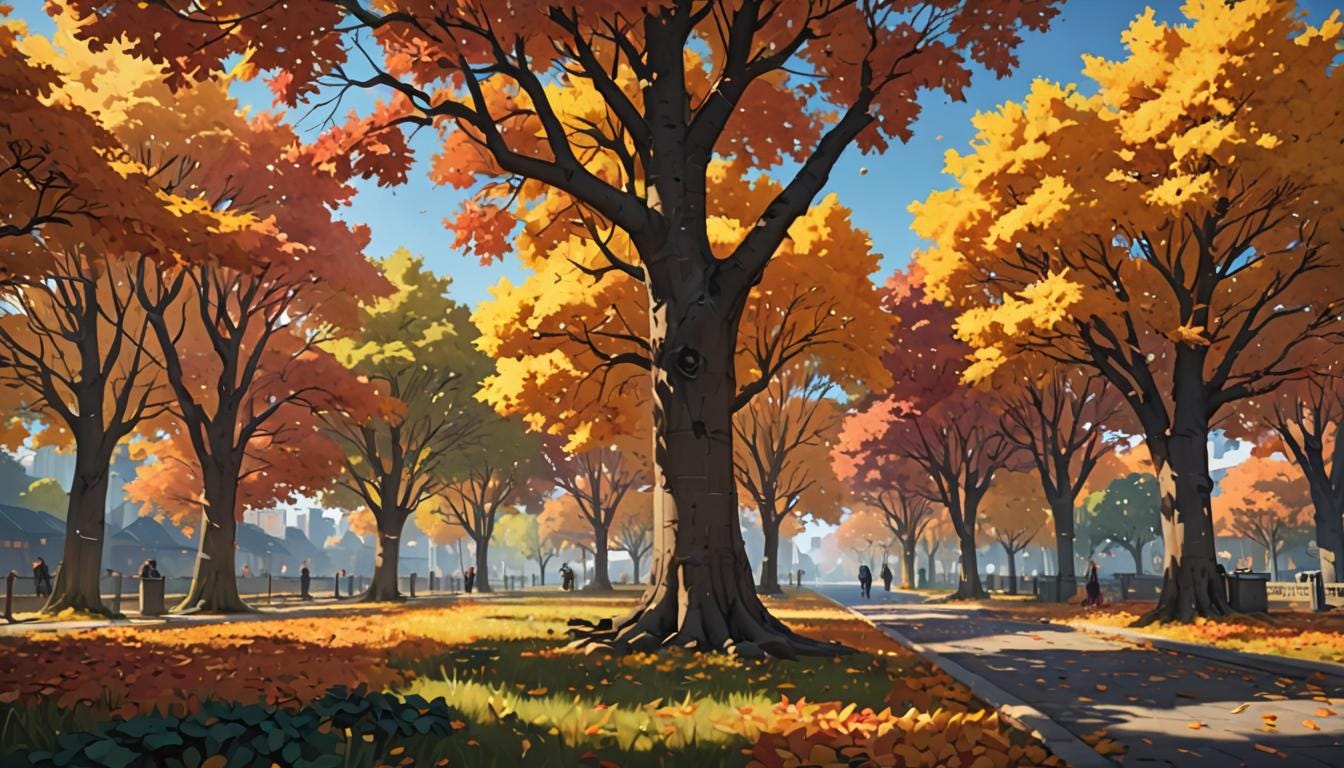Dear Poetry Enthusiasts,
Today, I'm excited to share with you a deeply personal piece titled "Autumn's Whisper." This poem explores the nuanced experience of aging, self-reflection, and the bittersweet nature of time's passage. Let's dive into its structure, themes, and the poetic devices that bring its message to life. But first here is the poem:
Autumn's Whisper
The mirror catches my eye, unfamiliar,
a stranger's face etched with time's careful hand.
Grey hairs sprout like wisdom's weeds,
unwelcome, yet earned.
My bones creak a symphony of years passed,
joints conducting an orchestra of remembrance.
I stand at the precipice of seasons changing,
summer's warmth fading in my peripheral vision.
The world spins faster now, or do I move slower?
Children I once cradled cradle their own,
their laughter echoing across generations.
My story, once a blank page, now heavy with ink.
In this autumn, I am both harvest and harvester,
reaping the fruits of springs long gone.
The wind whispers of winter's approach,
but today, I bask in the golden light of fall,
savoring the bittersweet ripeness of my days.
Structure and Form
"Autumn's Whisper" is a free verse poem, consisting of five stanzas of varying lengths. This flexible structure mirrors the organic, flowing nature of thoughts and memories that the poem explores. The lack of a rigid rhyme scheme or meter allows for a more conversational tone, inviting readers to experience the speaker's introspection as if they were privy to their inner monologue.
Thematic Analysis
The poem's central theme is the process of aging and the self-awareness that comes with it. It captures the moment of recognition when one realizes they've entered a new phase of life, symbolized by the autumn season. Key themes include:
1. **Self-perception and change**: The opening lines immediately confront the reader with the speaker's altered self-image, setting the tone for the introspective journey that follows.
2. **Physical aging**: References to grey hairs and creaking bones vividly illustrate the physical manifestations of aging.
3. **The passage of time**: The poem explores how our perception of time changes as we age, with the world seeming to move faster around us.
4. **Legacy and continuity**: The image of children having their own children speaks to the cycle of life and our place within it.
5. **Acceptance and appreciation**: Despite the melancholy tone, the poem ends on a note of acceptance, even celebration, of the current stage of life.
Poetic Devices and Techniques
1. **Metaphor**: The poem is rich with metaphors, most notably the extended metaphor of seasons representing life stages. Autumn symbolizes middle to late adulthood, with winter hinting at the approach of life's final stage.
2. **Imagery**: Vivid sensory details bring the experience to life, from the visual "Grey hairs sprout like wisdom's weeds" to the auditory "bones creak a symphony of years passed."
3. **Personification**: Time is personified as having a "careful hand," imbuing the aging process with a sense of intentionality and craftsmanship.
4. **Juxtaposition**: The poem frequently contrasts past and present, youth and age, creating a poignant tension that drives the narrative forward.
5. **Alliteration**: Subtle use of alliteration, as in "wisdom's weeds," adds musicality to the verse.
6. **Symbolism**: The mirror serves as a powerful symbol for self-reflection and the sometimes shocking recognition of our changing selves.
The Power of Free Verse
By employing free verse, I aimed to create a more intimate connection with the reader. This form allows for natural pauses and emphasis, mimicking the rhythms of thought and speech. It also provides the flexibility to shift tone and pace, reflecting the meandering nature of reflection and memory.
"Autumn's Whisper" is an exploration of the human experience of aging, rendered in the language of nature and seasons. Through its vivid imagery and thoughtful introspection, it invites readers to contemplate their own journey through life's seasons.
I hope this poem resonates with you, dear readers. Whether you find yourself in the spring, summer, autumn, or winter of your life, may it encourage you to pause and appreciate the unique beauty of your current season.
What are your thoughts on "Autumn's Whisper"? How do you relate to its themes? I'd love to hear your interpretations and experiences in the comments below.
Until next time, keep reading, keep reflecting, and keep embracing the poetry in your lives.
Your Poetry Genius,
Tom Kane







Another beautiful poem here. Thank you for sharing. You drew from the aging with warmth and accuracy that will appeal to those of us who accept such change. Getting old sucks. Poetry helps us see the silver lining can be found in more places than on our heads.